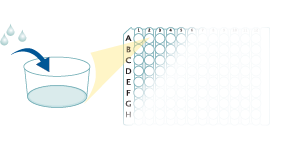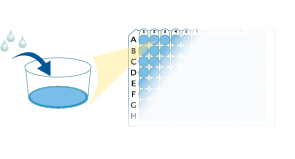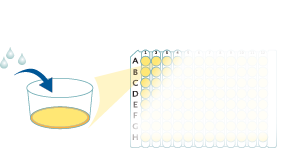Mouse VCAM-1/CD106 Quantikine ELISA Kit Summary
Product Summary
Precision
Cell Culture Supernates
| Intra-Assay Precision | Inter-Assay Precision | |||||
|---|---|---|---|---|---|---|
| Sample | 1 | 2 | 3 | 1 | 2 | 3 |
| n | 20 | 20 | 20 | 20 | 20 | 20 |
| Mean (ng/mL) | 0.96 | 2.84 | 8.55 | 0.87 | 2.64 | 8.5 |
| Standard Deviation | 0.05 | 0.13 | 0.37 | 0.07 | 0.18 | 0.63 |
| CV% | 5.2 | 4.6 | 4.3 | 8 | 6.8 | 7.4 |
Serum, EDTA Plasma
| Intra-Assay Precision | Inter-Assay Precision | |||||
|---|---|---|---|---|---|---|
| Sample | 1 | 2 | 3 | 1 | 2 | 3 |
| n | 20 | 20 | 20 | 20 | 20 | 20 |
| Mean (ng/mL) | 0.93 | 2.61 | 8.58 | 0.86 | 2.46 | 8.46 |
| Standard Deviation | 0.07 | 0.17 | 0.4 | 0.05 | 0.11 | 0.65 |
| CV% | 7.5 | 6.5 | 4.7 | 5.8 | 4.5 | 7.7 |
Recovery
The recovery of mouse sVCAM-1 spiked to three levels throughout the range of the assay in various matrices was evaluated.
| Sample Type | Average % Recovery | Range % |
|---|---|---|
| Cell Culture Supernates (n=6) | 100 | 89-112 |
| EDTA Plasma (n=4) | 100 | 81-119 |
| Serum (n=10) | 99 | 80-118 |
Linearity
Scientific Data
Product Datasheets
Preparation and Storage
Background: VCAM-1/CD106
VCAM-1 (Vascular Cell Adhesion Molecule-1; CD106) is a transmembrane molecule that mediates the adhesion of immune cells to the vascular endothelium during inflammation. It binds to several integrins including alpha4/beta1 (VLA-4), alpha4/beta7, alpha9/beta1, and alphaD/beta2. It is expressed constitutively in the bone marrow where it regulates T cell, B cell, and hematopoietic progenitor cell migration. A soluble form VCAM-1 can promote monocyte chemotaxis.
Assay Procedure
Refer to the product- Prepare all reagents, standard dilutions, and samples as directed in the product insert.
- Remove excess microplate strips from the plate frame, return them to the foil pouch containing the desiccant pack, and reseal.
- Add 50 µL of the appropriate Assay Diluent to each well.
- Add 50 µL of Standard, Control, or sample to each well. Cover with a plate sealer, and incubate at room temperature for 3 hours.
- Aspirate each well and wash, repeating the process 4 times for a total of 5 washes.
- Add 100 µL of Conjugate to each well. Cover with a new plate sealer, and incubate at room temperature for 1 hour.
- Aspirate and wash 5 times.
- Add 100 µL Substrate Solution to each well. Incubate at room temperature for 30 minutes. PROTECT FROM LIGHT.
- Add 100 µL of Stop Solution to each well. Read at 450 nm within 30 minutes. Set wavelength correction to 540 nm or 570 nm.





Citations for Mouse VCAM-1/CD106 Quantikine ELISA Kit
R&D Systems personnel manually curate a database that contains references using R&D Systems products. The data collected includes not only links to publications in PubMed, but also provides information about sample types, species, and experimental conditions.
27
Citations: Showing 1 - 10
Filter your results:
Filter by:
-
Pericardial Grafting of Cardiac Progenitor Cells in Self-Assembling Peptide Scaffold Improves Cardiac Function After Myocardial Infarction
Authors: Kanda, M;Nagai, T;Kondo, N;Matsuura, K;Akazawa, H;Komuro, I;Kobayashi, Y;
Cell transplantation
Species: Mouse
Sample Types: Cell Culture Supernates
-
Nrf2 Activation With CDDO-Methyl Promotes Beneficial and Deleterious Clinical Effects in Transgenic Mice With Sickle Cell Anemia
Authors: CA Ihunnah, S Ghosh, S Hahn, AC Straub, SF Ofori-Acqu
Frontiers in Pharmacology, 2022-05-10;13(0):880834.
Species: Mouse
Sample Types: Plasma
-
Natural Compound Resveratrol Attenuates TNF-Alpha-Induced Vascular Dysfunction in Mice and Human Endothelial Cells: The Involvement of the NF-kappaB Signaling Pathway
Authors: P Nallasamy, ZY Kang, X Sun, PV Anandh Bab, D Liu, Z Jia
International Journal of Molecular Sciences, 2021-11-19;22(22):.
Species: Mouse
Sample Types: Serum
-
Quercetin Completely Ameliorates Hypoxia-Reoxygenation-Induced Pathophysiology Severity in NY1DD Transgenic Sickle Mice: Intrinsic Mild Steady State Pathophysiology of the Disease in NY1DD Is Also Reversed
Authors: S Thangaswam, CA Branch, K Ambadipudi, SA Acharya
Biomolecules, 2021-10-06;11(10):.
Species: Mouse
Sample Types: Plasma
-
Dj1 deficiency protects against atherosclerosis with anti-inflammatory response in macrophages
Authors: T Sivasubram, J Yang, HS Cheng, A Zyla, A Li, R Besla, I Dotan, XS Revelo, SY Shi, H Le, SA Schroer, DW Dodington, YJ Park, MJ Kim, D Febbraro, I Ruel, J Genest, RH Kim, TW Mak, DA Winer, CS Robbins, M Woo
Scientific Reports, 2021-02-25;11(1):4723.
Species: Mouse
Sample Types: Cell Culture Supernates
-
Hydroxychloroquine reverses the prothrombotic state in a mouse model of antiphospholipid syndrome: Role of reduced inflammation and endothelial dysfunction
Authors: S Miranda, P Billoir, L Damian, PA Thiebaut, D Schapman, M Le Besnera, F Jouen, L Galas, H Levesque, V Le Cam-Duc, R Joannides, V Richard, Y Benhamou
PLoS ONE, 2019-03-14;14(3):e0212614.
Species: Mouse
Sample Types: Plasma
-
Trans-repression of NF?B pathway mediated by PPAR? improves vascular endothelium insulin resistance
Authors: Y Kong, Y Gao, D Lan, Y Zhang, R Zhan, M Liu, Z Zhu, G Zeng, Q Huang
J. Cell. Mol. Med., 2018-11-05;0(0):.
Species: Rat
Sample Types: Serum
-
Obeticholic acid protects against hepatocyte death and liver fibrosis in a murine model of nonalcoholic steatohepatitis
Authors: T Goto, M Itoh, T Suganami, S Kanai, I Shirakawa, T Sakai, M Asakawa, T Yoneyama, T Kai, Y Ogawa
Sci Rep, 2018-05-25;8(1):8157.
Species: Mouse
Sample Types: Serum
-
Targeted endothelial gene deletion of Triggering Receptor Expressed on Myeloid cells-1 protects mice during septic shock
Authors: L Jolly, K Carrasco, M Derive, J Lemarié, A Boufenzer, S Gibot
Cardiovasc. Res., 2018-05-01;0(0):.
Species: Mouse
Sample Types: Plasma
-
Simvastatin attenuates endothelial activation through 15-epi-lipoxin A4 production in murine chronic Chagas cardiomyopathy
Authors: Fabiola González-H
Antimicrob. Agents Chemother, 2017-02-23;0(0):.
Species: Mouse
Sample Types: Serum
-
A Critical Role for P2X7 Receptor-Induced VCAM-1 Shedding and Neutrophil Infiltration during Acute Lung Injury
J Immunol, 2016-08-24;0(0):.
Species: Mouse
Sample Types: BALF
-
Soluble Vascular Cell Adhesion Molecule-1 (VCAM-1) as a Biomarker in the Mouse Model of Experimental Autoimmune Myocarditis (EAM)
PLoS ONE, 2016-08-08;11(8):e0158299.
Species: Mouse
Sample Types: Tissue Homogenates
-
Reduction of adhesion molecule production and alteration of eNOS and endothelin-1 mRNA expression in endothelium by Euphorbia hirta L. through its beneficial beta-amyrin molecule.
Authors: Shih M, Cherng J
Molecules, 2014-07-18;19(7):10534-45.
Species: Mouse
Sample Types: Cell Culture Supernates
-
Endothelial mineralocorticoid receptor activation enhances endothelial protein C receptor and decreases vascular thrombosis in mice.
Authors: Lagrange J, Li Z, Fassot C, Bourhim M, Louis H, Nguyen Dinh Cat A, Parlakian A, Wahl D, Lacolley P, Jaisser F, Regnault V
FASEB J, 2014-01-22;28(5):2062-72.
Species: Mouse
Sample Types: Plasma
-
Early protection from burn-induced acute lung injury by deletion of preprotachykinin-A gene.
Authors: Sio SW, Moochhala S, Lu J
Am. J. Respir. Crit. Care Med., 2009-10-01;181(1):36-46.
Species: Mouse
Sample Types: Tissue Homogenates
-
Alternative implication of CXCR4 in JAK2/STAT3 activation in small cell lung cancer.
Authors: Pfeiffer M, Hartmann TN, Leick M, Catusse J, Schmitt-Graeff A, Burger M
Br. J. Cancer, 2009-05-19;100(12):1949-56.
Species: Mouse
Sample Types: Cell Culture Supernates
-
Early atherosclerosis and vascular inflammation in mice with diet-induced type 2 diabetes.
Authors: Bartels ED, Bang CA, Nielsen LB
Eur. J. Clin. Invest., 2009-03-01;39(3):190-9.
Species: Mouse
Sample Types: Plasma
-
Prevention of murine antiphospholipid syndrome by BAFF blockade.
Authors: Kahn P, Ramanujam M, Bethunaickan R, Huang W, Tao H, Madaio MP, Factor SM, Davidson A
Arthritis Rheum., 2008-09-01;58(9):2824-34.
Species: Mouse
Sample Types: Serum
-
Aspergillus fumigatus stimulates leukocyte adhesion molecules and cytokine production by endothelial cells in vitro and during invasive pulmonary disease.
Authors: Chiang LY, Sheppard DC, Gravelat FN, Patterson TF, Filler SG
Infect. Immun., 2008-05-19;76(8):3429-38.
Species: Mouse
Sample Types: Tissue Homogenates
-
Vascular dysfunction in a murine model of severe hemolysis.
Authors: Frei AC, Guo Y, Jones DW, Pritchard KA, Fagan KA, Hogg N, Wandersee NJ
Blood, 2008-05-13;112(2):398-405.
Species: Mouse
Sample Types: Plasma
-
A neutralizing antibody against receptor for advanced glycation end products (RAGE) reduces atherosclerosis in uremic mice.
Authors: Bro S, Flyvbjerg A, Binder CJ, Bang CA, Denner L, Olgaard K, Nielsen LB
Atherosclerosis, 2008-02-16;201(2):274-80.
Species: Mouse
Sample Types: Plasma
-
Vascular and inflammatory stresses mediate atherosclerosis via RAGE and its ligands in apoE-/- mice.
Authors: Harja E, Bu DX, Hudson BI, Chang JS, Shen X, Hallam K, Kalea AZ, Lu Y, Rosario RH, Oruganti S, Nikolla Z, Belov D, Lalla E, Ramasamy R, Yan SF, Schmidt AM
J. Clin. Invest., 2008-01-01;118(1):183-94.
Species: Mouse
Sample Types: Plasma
-
Atheroprotective role of interleukin-6 in diet- and/or pathogen-associated atherosclerosis using an ApoE heterozygote murine model.
Authors: Madan M, Bishayi B, Hoge M, Amar S
Atherosclerosis, 2007-04-06;197(2):504-14.
Species: Mouse
Sample Types: Serum
-
Cell-based angiopoietin-1 gene therapy for acute lung injury.
Authors: McCarter SD, Mei SH, Lai PF, Zhang QW, Parker CH, Suen RS, Hood RD, Zhao YD, Deng Y, Han RN, Dumont DJ, Stewart DJ
Am. J. Respir. Crit. Care Med., 2007-02-22;175(10):1014-26.
Species: Mouse
Sample Types: Plasma
-
Ionizing radiation accelerates the development of atherosclerotic lesions in ApoE-/- mice and predisposes to an inflammatory plaque phenotype prone to hemorrhage.
Authors: Stewart FA, Heeneman S, Te Poele J, Kruse J, Russell NS, Gijbels M, Daemen M
Am. J. Pathol., 2006-02-01;168(2):649-58.
Species: Mouse
Sample Types: Plasma
-
Suppression of graft coronary artery disease by a brief treatment with a selective epsilonPKC activator and a deltaPKC inhibitor in murine cardiac allografts.
Authors: Tanaka M, Terry RD, Mokhtari GK, Inagaki K, Koyanagi T, Kofidis T, Mochly-Rosen D, Robbins RC
Circulation, 2004-09-14;110(11):II194-9.
Species: Mouse
Sample Types: Tissue Homogenates
-
Cardiomyocyte-specific Bcl-2 overexpression attenuates ischemia-reperfusion injury, immune response during acute rejection, and graft coronary artery disease.
Authors: Tanaka M, Nakae S, Terry RD, Mokhtari GK, Gunawan F, Balsam LB, Kaneda H, Kofidis T, Tsao PS, Robbins RC
Blood, 2004-07-27;104(12):3789-96.
Species: Mouse
Sample Types: Tissue Homogenates
FAQs
No product specific FAQs exist for this product, however you may
View all ELISA FAQsReviews for Mouse VCAM-1/CD106 Quantikine ELISA Kit
There are currently no reviews for this product. Be the first to review Mouse VCAM-1/CD106 Quantikine ELISA Kit and earn rewards!
Have you used Mouse VCAM-1/CD106 Quantikine ELISA Kit?
Submit a review and receive an Amazon gift card.
$25/€18/£15/$25CAN/¥75 Yuan/¥2500 Yen for a review with an image
$10/€7/£6/$10 CAD/¥70 Yuan/¥1110 Yen for a review without an image










